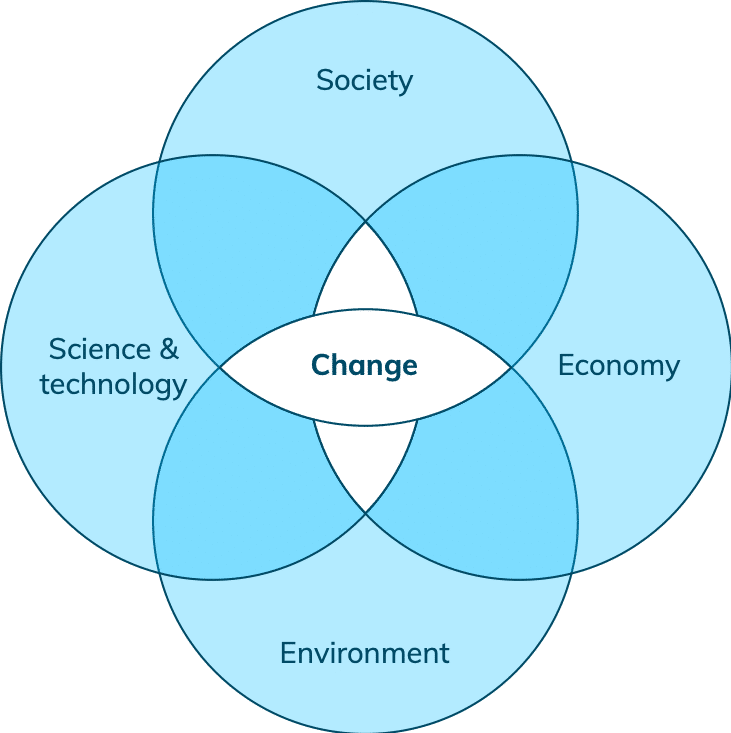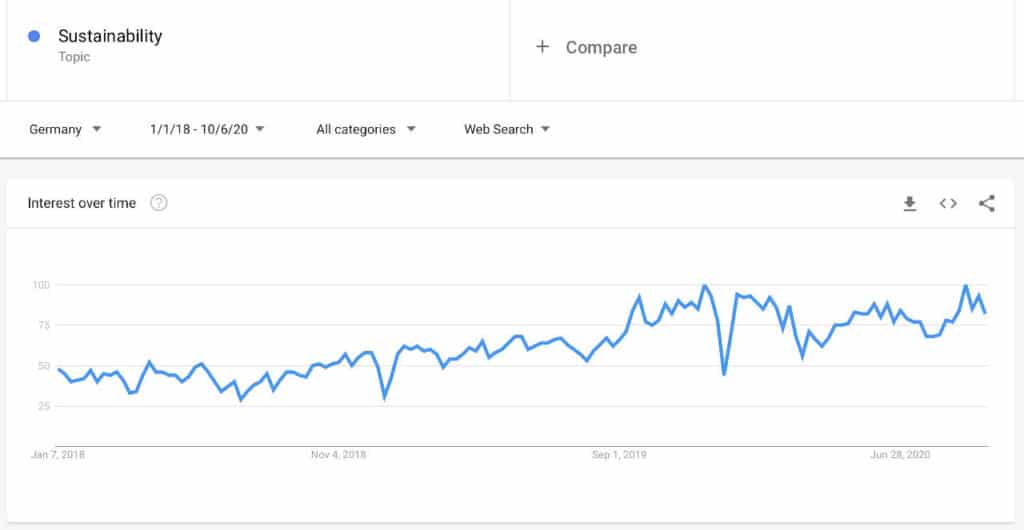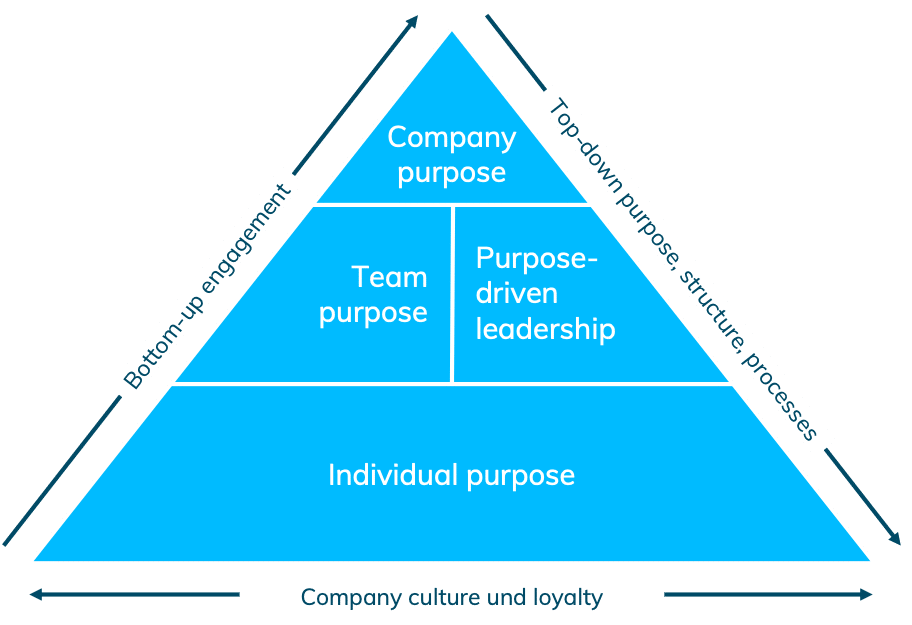The buzzword #NewWork bundles a need to rethink the concept of “work” and adapt it to new requirements of society and individual happiness – which is a challenge for many companies
Constant Change
Have you ever heard of a Purpose-Driven Organization? Or holacracy? Do you already have various ‘culture initiatives’ underway in your company and do you already have a CDO Chief Diversity Officer? (yes, we know buzzwords…)
Yet underneath all these trending and important labels lies is deeper need and profound shift: The challenge that not only the descriptive words, but also the understanding of work changes. And this change happens currently to an extent that was probably last seen during industrialization.
One thing seems a little different this time, though – without having a direct comparison, since we obviously weren’t alive yet during that time: The role of society. Back during the industrialization, it seems that technical innovation was the predominant factor to change the economy and society. And of course, also today some of the current change can be traced back to technical progress – and ‘Early Adopters’, ‘Tech Evangelists’ and ‘Chief Innovation Officers’ praise salvation in the form of digitization, robotics, AI / ML, NLP, AR / VR, Voice, Blockchain, IoT, etc. (even more buzzwords). But many of these technologies has been evolving already exponentially for several decades and there is no clear quantum leap like the introduction of machines and factories that explain the jolt that seems to be going through society at the moment. And even the complex interplay of several other exponential changes – i.e. in the environment (e.g. climate change, geopolitical unrest) and in the economy (e.g. global supply chains, home office) in addition to technology, are still not sufficient to explain the extent of the current shift.

A separate strong momentum for change comes from society itself, as a collective of rapidly growing needs for an individually fulfilling, purposeful and sustainable life – and the realignment of work in it. An important catalyst for this has been and certainly is Covid-19, but the deeper longing for meaning, purpose and clarity has been simmering for much longer – and presents companies with big challenges to retain customers, employees and stakeholders in the long term and to take on social responsibility.
Change in Society
What is it, which drives our society into so much change right now? The short answer is probably that there is no short answer. On one hand, millennials and generation Y ask big questions about WHY while being caught in a concurrent massive demographic change. Then we experience a pandemic that leaves us with visceral basic fears of survival, our health and prosperity – unknown to most of them. We see political players behaving archaic while jeopardizing a peaceful, global coexistence – and this not in the third world, but in the ‘most developed’ countries. The very foundations for mutual understanding and a common dialogue seem to be getting lost: mutual respect, integrity, dependability on facts or any common denominator. Language itself gets brutalized and any diversity in the form of opinions, origins, beliefs, gender, etc. is either heavily streamlined or polarized and popularized. We see pictures of infernal forest fires and torrential floods …
All of these examples lead to an unprecedented complexity of the world that overburdens us individually and collectively. But despite all the worries about this complexity, there is also something positive about it: We ache for the simple, the clear and important things. For certainty, safety, for human closeness, and to find purpose and meaning – if not in the world around us, then at least for ourselves.
“The lack of orientation in the complexity of the world makes us search for clarity and meaning within.”
And so, in addition to the hash tags for individual topics (#blacklivesmatter, #metoo, #diversity, #inclusion, etc.), generic values, which were long considered outdated re-occur in youth studies, such as health, safety, friends and family. And across all generations, the insights of the ancient philosophers on a happy, fulfilled life seem to be experiencing a renaissance: Sustainability, purpose, responsibility, community.

The Impact on Companies
What do these changes mean for companies? Rapid changes in technology, the environment, and the economy have already been forcing companies to continuously innovate for a while. But now there is and additional challenge: a change in individual needs and collective values in society. It is no longer enough to be an innovative and profitable company. A company has to think about character, values, emotions and other human traits in order to be accepted and taken seriously by all relevant stakeholders.
How does a company manage to take responsibility for a sustainable society, retain employees, convince customers and satisfy shareholders? How do companies manage the triple bottom-line of people, planet, profit?
The costs of ignoring the underlying shift are high: More and more customers actively search for sustainably manufactured products, employees with a lacking emotional connection to their company create economic costs of up to €105 billion annually in Germany (Gallup estimates), and even professional investors show a growing interest in ESG (Environmental, Social, and Governance), SRI (Socially Responsible Investing) or impact investing. And more and more companies are following well-known examples that think beyond the profit bottom-line, such as Unilever, Patagonia, Tesla, Beyond Meat, etc.
However, any attempt to optimize the outcome for one group of stakeholders often leads to a trade-off against others. A common denominator is needed that creates value for all stakeholders – and the best candidate for this is purpose. When employees see a purpose in their task beyond salary and status, they are more likely to identify with the company and stay engaged long term. Coupled with a positive corporate culture, this increases productivity, improves quality of work, and accelerates innovation. This, in turn, is appreciated by customers, which makes shareholders happy. And a sustainably oriented company with a purpose-driven mission automatically assumes more social responsibility.
Of course, this description is simplified and harbors some risks, but we don’t know of any alternative approach that unites all stakeholder interests as effectively as a purpose-driven organization. And in economic research there is also evidence of sustainable competitive advantages for such companies (see, for example, the “firms of endearment” by Raj Sisodia et al.).
Purpose-Driven Organizations
So much for the theory, but what actually is a Purpose-Driven Organization (PDO)? We define them as follows:
“A purpose-driven organization manages to sustainably align the interests of all stakeholders via a shared purpose and meaningful corporate culture.”
Purpose cannot be enforced top-down, but there are many levers to foster the change to a PDO. This requires a coordinated approach across three different levels:
- • At the corporate level, a company purpose needs to be integrated holistically with the company’s core principles (vision, mission, strategy and values) and to be reflected in structure and processes
- At the team level, cooperation can be fostered through jointly developed values, strengths and team purpose, as well as purpose-driven leadership
- At the individual level, should be supported in their personal and professional development to recognize their individual purpose and deeper meaning in life and work

Almost all companies have at least an implicit company purpose or a mission that holds the potential for deeper meaning. The key question is, however, if it still fits the changed needs of society – and whether it is understood, shared, and lived by the employees. In our own experience, we could often observe a bigger need to reorientation in very traditional companies, founder-led SMEs and companies, with operate on ‘older’ development stages in concepts such as Graves Values or Spiral Dynamics.
- At the company level, a reorientation and shift to a PDO is difficult to standardize and usually requires individual sparring and advice.
- At the team level, however, the effective collaboration and team purpose can be fostered by certain standardized and proven concepts from research and practice. A good example of a structured team workshop is our 1 to 2-day zentor Purpose Bootcamp.
- Also on the team level an engaging and motivating management is needed, which can be developed by combining the Purpose Bootcamp with individual coaching of high potentials and managers towards a purpose-driven leadership
- At the level of individual purpose, questions around individual fulfillment and the meaning of life are obviously hard to answer in a one-day seminar. Using key findings of happiness research, we’ve thus have developed an interactive online course, which guides the search for an individual purpose in 12 units over several weeks. It can be done remotely with fully flexible timing and lays the foundation for fulfilled and engaged employees.
The only constant in life is change. This seems to be more true than ever in this day and age of major changes in society. To keep up with this as a company and to remain attractive in the long term to employees, customers, and shareholders – in addition to taking on social responsibility – requires change within many organizations. The concept of Purpose-Driven Organizations provides important insights and approaches so make this change successful.
Sources and further reading:
- Calmbach, Flaig, Edwards, Möller-Slawinski, Borchard, & Schleer. (2020). Sinus Studie: Wie ticken Jugendliche? 2020.
- Nink, M. (2017). Engagement Index Deutschland 2016. Gallup. Retrieved from http://www.gallup.com/de-de/181871/engagement-index-deutschland.aspx
- Sisodia, R., Wolfe, D. B., & Sheth, J. (2014). Firms of Endearment: How World-Class Companies Profit from Purpose and Passion. also see: http://www.firmsofendearment.com
- https://de.wikipedia.org/wiki/Spiral_Dynamics
- https://en.wikipedia.org/wiki/Impact_investing
- https://trends.google.com/trends/explore?date=2018-01-01%202020-10-06&geo=DE&q=%2Fm%2F0hkst
- https://www.investopedia.com/financial-advisor/esg-sri-impact-investing-explaining-difference-clients/